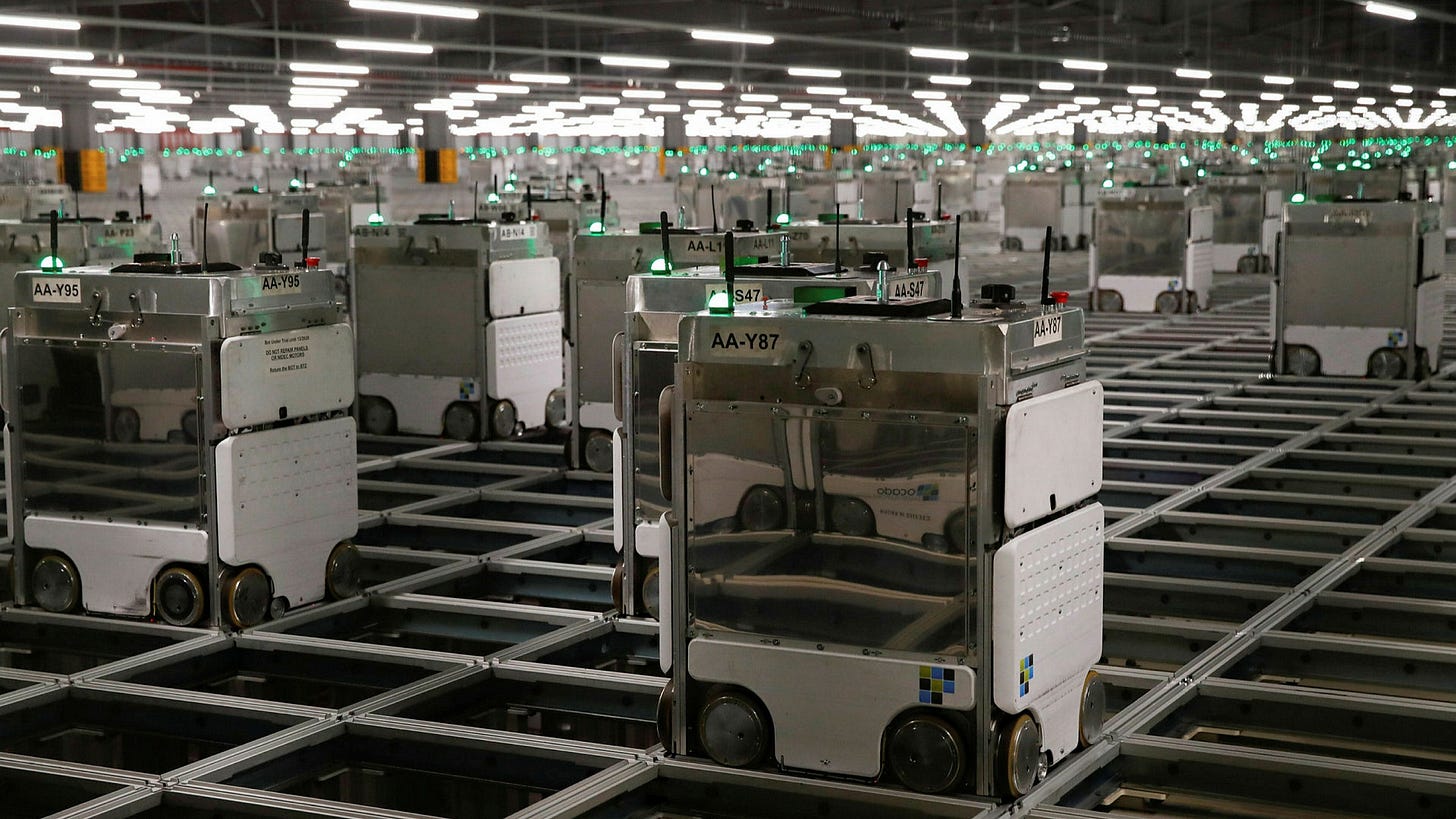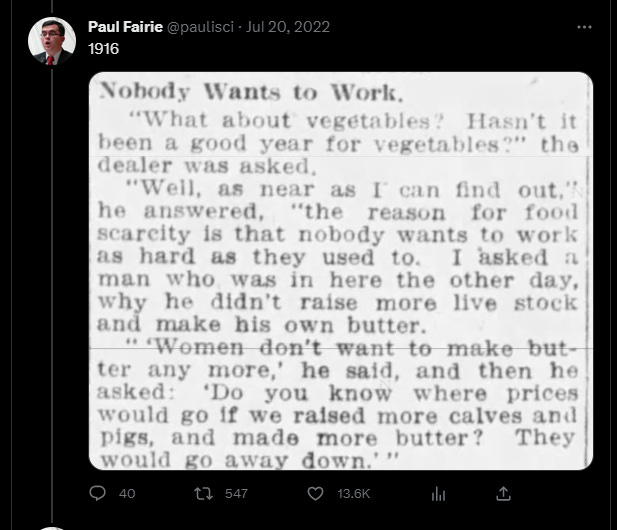Applying AI needs more imagination
There's a lot of froth around how generative AI will affect communications. We need to expand our horizons and imagine a better future.
Since lockdown two, I've become a coffee obsessive. Back in the day, I'd choose Starbucks over everything. Not because of the passable coffee but because of the novelty/ease of pre-ordering drinks on the app. So refreshing to turn up, grab your drink and go. But we decided to invest in a home espresso machine when lockdown two saw our favourite independent coffee shop in Farnham close down (Krema is still open in Guildford if you're ever in the area). Since then, my YouTube feed has been full of bearded baristas offering tips and tricks on the best ways to steam milk and extract the best espresso. I still haven't mastered milk art; that's next.
Making your own milk-based espresso drinks exposes you to the inner workings of different types of coffee. Before making them for my mother-in-law, I never realised quite how frothy a cappuccino is. It's basically foam and espresso. And in thinking about how we might apply the current wave of generative AI tools to PR and communications over the past couple of weeks, I feel like we're at the cappuccino stage of adoption. It's still all froth with little substance (apologies to cappuccino lovers).
There is substance there (the espresso in this analogy); I'm sure many of you have tried out ChatGPT and Midjourney to get started on a piece of writing or create an image you had in mind but couldn't find on Unsplash. But beyond that, the use cases from comms are still limited.
But if you believe some of the headlines across the media, generative AI tools will make anyone with a traditionally "white collar", knowledge-based job like comms completely rethink their relationship with work - perhaps even removing swathes of the workforce thanks to the software’s advanced capabilities.
The thing is, we've been here before with the “end of work” scenarios. My first trip to SXSW was in 2017, and back then, everyone was VERY frothy about AI. The machine learning and neural networks that power tools like ChatGPT were new and exciting. People were also very frothy (myself included) about the potential of voice assistants - that's not aged well. There was also lots of talk about automation and the changing nature of the workforce - Ocado were the darlings of this narrative, with their fancy warehouse robots.
But, in a typical human fashion, the frothiness of 2017 overestimated what would happen in two years and underestimated what will happen in ten years. When it comes to predicting the impact of new technologies, we often struggle to think about the long-term.
Particularly in PR and comms, we get excited about new things, imagining ways to apply them to our work. We need help to zoom out and take a long-term view. The best way to do this is by looking back. One of my favourite Twitter accounts is Pessimists Archive, which juxtaposes current headlines about the "ruin of society" with the same headlines from the distant past.
When it comes to the topic of technology making jobs redundant, we've been here before. As Benedict Evans wrote in his column this week, roles such as "data keyer", "telephone operator", and "typists" have disappeared from our workforce. But those people didn't stop working; they found alternative jobs as the new technology opened up new opportunities.
We can also look at history and see that technology doesn't permanently remove jobs and tasks; it empowers people to do more, better. Computers and software programs made everything from designing decks to crunching numbers much more straightforward. So we make more decks look more beautiful; more people use Excel to analyse campaign performance and analytics. As
wrote in Not Boring, "Will [AI] take designers' jobs, or will we demand better design?" In our agency, our design team spend lots of time making other people's decks look beautiful; we could be adding more video and dynamism to our decks if the base level of quality was exponentially higher.The truth is, no one knows what the future will look like - as I've said, humans are notoriously bad at predictions, so all this might be completely wrong. If that is the case, I, for one, will welcome our science fiction-style AI robotic overlords and enjoy not working by playing my guitar.
We're also bad at predictions because we imagine the future through our own lens. We look at the world around us and envision a relatively linear future where many core aspects stay the same, but just get better. So with generative AI tools, we imagine ChatGPT getting smarter and smarter until we can outsource all our thoughts to it, making ourselves redundant.
Most current thinking I've read about applying generative AI tools to PR and comms uses this approach. And that's fine, but it's a bit boring. I won't attend any more conferences on the "future of AI and PR" for a while; the PR Moment one I went to was fine but pretty repetitive and lacked imagination.
I'm keen to broaden the horizons of how we might be able to apply new AI-powered software to PR and comms. To stretch our imaginations beyond what we see every day. What would you do differently if you could? What are the constraints you work under? How could you improve your consultancy if you had access to better, faster, more comprehensive knowledge?
Here are a few ideas:
One of my ongoing bugbears when we're planning campaigns - we are not our target audience. But doing first-party research with your target audience is time-consuming and expensive - it can also be tough the more specific your target audience (those mythical, mystical "stakeholders"). Wouldn't it be fantastic if we could apply advanced software to the process of briefing out and compiling interviews, focus groups and quant surveys? Our campaign responses would be richer, better informed and more reflective of what our audiences care about.
We could apply a similar lens to third-party research. I have my own tried and tested research journey when working on a new client or sector:
Start with some Search Listening.
Move on to some Brandwatch and Quid analysis.
Look for related stand-up sets on YouTube.
Dig out some New Yorker-style long reads relative to the topic.
But 80% of planners, strategists and comms people have similar, if not the same, journeys. And if we're all using the same inputs, our outputs will also look alarmingly similar. Wouldn't it be fantastic to use a tool like ChatGPT (but it would have to be better and not use the slightly cumbersome chatbot interface) to expand our research? To feed the software a brief and encourage it to go deep and broad simultaneously (to use
's phrase). Go deep on what institutional investors think about sustainable finance; go broad on attitudes to ESG investing more generally.We're already on the cusp of the ability to easily create videos based on a text-based brief - which will be a game changer for pitches. While I will miss pretending I'm a professional voiceover artist, dramatically narrating the flow of a video to try and sell the concept to a client, it will be way more helpful to show a rough cut of what the video will look like. Especially as it will almost completely remove the worst piece of feedback you can receive; the dreaded "Oh, I didn't think it would look like that".
Using software in these ways is unlikely to make your job redundant; it will provide you with more tools in your arsenal and the ability to generate more informed, more robust work - whatever you want it to be, that you feel it's lacking right now.
Please don't get distracted by the frothy headlines and the pseudo-science fiction applications; what we're looking for in the comms application of AI is more like a flat white. A thick, velvety consistency that makes our work and thinking richer and more enjoyable.







Very thoughtful piece! And thanks for the kind shoutout.